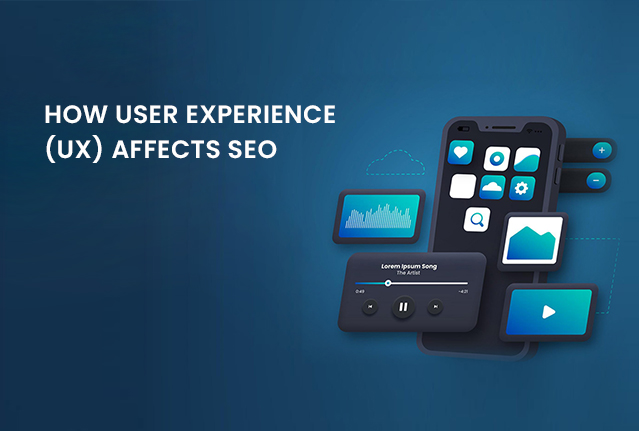

Posted by Kalyani Nikumbh on Wed, 26/04/2023

User experience (UX) is an essential factor to determine the success of a website. It not only plays a critical role in how visitors interact with a site, but it also affects its search engine optimization (SEO). As one of the best SEO companies in India, 4Fox Solutions recognizes the importance of UX strategy solutions for achieving optimal SEO results. User Experience (UX) is an important aspect of web design and development, and it has a significant impact on the success of a website. It determines how visitors interact with your website and the impression they get from it. However, did you know that UX also affects SEO? In this blog post, we will explore the relationship between UX design and SEO, and how 4Fox Solutions, the best SEO company in India, can help you improve your website's SEO UX design.
What is User Experience?
The overall experiences a user faces while interacting with a website are referred to as User Experience. It encompasses everything from the site's design, content, and navigation to its load speed and responsiveness. A website with good UX is easy to navigate, visually appealing, and provides users with the information they need quickly and efficiently. User experience or UX services refers to the overall experience that a user has when interacting with a website, app, or product. It encompasses everything from how easy it is used to navigate the website, to the loading speed, to the design and layout of the website. A website with a good UX is intuitive, easy to use, and provides a positive user experience.
How User Experience Affects SEO?
User experience is a crucial factor in SEO. Search engines like Google and Bing aim to provide users with the best possible experience by directing them to websites that meet their needs. Therefore, if your website offers a poor user experience, search engines will not recommend it to users. Here are seven ways user experience affects SEO:
Bounce rate: Users leave the website after viewing only one page called the bounce rate. If a high bounce rate occurs on website while searching it indicates that users did not find what they are looking for. Search engines interpret a high bounce rate as a sign that a website is not relevant or useful to users, which can negatively impact its SEO. Therefore, a website with a high bounce rate is unlikely to rank well in search engine results pages (SERPs).
Dwell time: Dwell time refers to the amount of time users spend on a website. Search engines consider dwell time as an indicator of a website's relevance and usefulness to users. If users spend a long time on a website, it suggests that they have found what they were looking for and that the site offers value. As a result, search engines will reward the website with higher rankings in SERPs.
Mobile responsiveness: The performance of a website on a mobile device is term as Mobile responsiveness. With the increase in mobile device usage, search engines like Google have made mobile responsiveness a ranking factor. Websites that are not mobile-friendly will not rank well in mobile search results, which can significantly impact their overall SEO.
Mobile-Friendly Design: A mobile-friendly website is a must in today's world, where more than half of all internet traffic comes from mobile devices. Google's algorithms favor websites that are mobile-friendly and provide a positive user experience on mobile devices. Therefore, having a mobile-friendly design is critical for both UX and SEO.
Easy Navigation: Navigation refers to how easy it is for users to find the information they need on a website. With poor navigation, a website will frustrate users & lead to a high bounce rate. Search engines consider navigation as a ranking factor because it is a critical aspect of user experience. A website with good navigation is likely to rank higher than one with poor navigation. Easy navigation is an important aspect of UX, and it also affects SEO. A website with easy navigation makes it easy for users to find what they are looking for, and this can lead to a lower bounce rate & higher time spent on the website. Google also considers navigation when ranking websites, and websites with easy navigation are more likely to rank higher in search results.
Content Quality: The quality of the content on a website is crucial for both UX and SEO. Thus, it is important to keep high-quality content that is engaging & informative. Google's algorithms also favor high-quality content & penalize websites with low-quality content. Therefore, it is essential to focus on creating high-quality content that provides value to users.
Website Speed: Website speed is a crucial factor in both UX and SEO. Users expect a website to load quickly, and if it takes too long, they are likely to leave the website. When ranking websites Google also considers website speed. Slow-loading websites are penalized in search rankings & websites that load quickly are rewarded. Therefore, it is essential to optimize your website's speed for both UX & SEO.
Why User Experience is Crucial for SEO
User experience is crucial for SEO because it directly impacts a website's ability to rank well in search engine results. A website with good UX is more likely to have a low bounce rate, high dwell time, and be mobile-friendly. These factors contribute to higher rankings in SERPs, which can lead to increased traffic and conversions.
Moreover, a website with a good user experience can help businesses build their brand reputation. Users are more likely to trust and return to a website that provides them with a positive experience. As a result, a website with good UX is more likely to attract backlinks and social media shares, which are important ranking factors in SEO. Google's ultimate goal is to provide the best user experience to its users. Therefore, Google's algorithms are designed to reward websites that provide a positive user experience. While ranking websites Google considers many factors, including the bounce rate, time spent on the website, and click-through rate. All of these factors are directly related to user experience. If a website has a high bounce rate, it means that users are not finding what they are looking for and leaving the website quickly. Similarly, if users are spending a short amount of time on a website, it means they are not finding the content engaging enough. When ranking websites Google's algorithms take all of these factors into account, and websites that provide a positive user experience are more likely to rank higher in search engine results pages (SERPs).
User Experience for Better SEO: Improving user experience can significantly improve a website's SEO. For this one need to find a good UX agency in India that provides good user experience services. Here are tips on how to improve the user experience for better SEO:
Optimize for mobile devices: It is important to optimize your website, as the use of mobile devices has increased. As mobile-friendly websites rank higher in mobile search results. A good UX design studio optimizes your website for mobile devices and ensures that it provides a positive user experience on all devices.
Website Design & Development: A good UX agency in India can design & develop a website that provides a positive user experience and can focus on creating websites that are easy to navigate, load quickly, and provide high-quality content.
As a user experience design agency, a good User experience agency must consider the above-mentioned factors. Thus, to get a good rank in search engines hires the best SEO services in India with 4Fox Solutions.